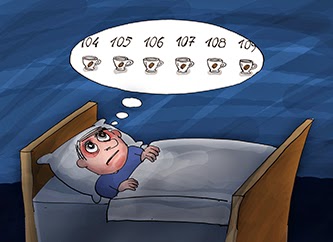Joint program of Rutgers and RWJ University Hospital offers range of sleep studies and treatment options for patients of all ages
By Robin Warshaw Friday, September 12, 2014
 |
| Patients suffering from insomnia find relief through a joint program through Rutgers Robert Wood Johnson Medical School and Robert Wood Johnson University Hospital. |
For more than 30 years, Donna* believed her chronic insomnia was something she and medical science couldn’t change. Most nights, she had difficulty falling asleep and staying asleep. Her doctors prescribed various medicines that did little to help.
Donna pushed her way through an ever-present blanket of fatigue to succeed in her career and raise three children. Yet the insomnia took its toll. “I was exhausted, I was irritable,” she says. “I somehow managed to have energy for things I needed and wanted to do, but I was sleep deprived. It was part of my life.”
When an acquaintance mentioned that a sleep specialist might help, Donna wasn’t interested at first. “I thought I had already been on everything,” she says. Realizing she had never seen a sleep expert, she went to the
Comprehensive Sleep Disorders Center, a joint program of Rutgers Robert Wood Johnson Medical School and Robert Wood Johnson University Hospital. To her surprise, “they had a completely different approach,” including patient education, behavioral changes and sophisticated testing.
5 Ways to Put Insomnia to Rest Advice
Advice for defeating insomnia, from physicians at the Comprehensive Sleep Disorders Center, Robert Wood Johnson University Hospital, New Brunswick:
1. Take anything with a screen out of your bedroom – TVs, cellphones, tablets, laptops. Use your bedroom for sleep or sex only.
2. Go to bed only when sleepy. To relax, take a hot shower, meditate or do yoga.
3. Get up at the same time every day, Monday through Sunday, no matter how little you’ve slept.
4. If you wake during the night and cannot go back to sleep after 15 minutes, get out of bed and do something restful and calming. Read or listen to music. Do not watch television or get on the computer. Do not go back to bed until very sleepy.
5. Do not nap, even on weekends
Chronic insomnia, such as Donna experienced, is common and may be increasing due to 24-hour connected lifestyles, says Anays M. Sotolongo, medical director of the sleep center. Unlike acute insomnia, a short-term condition caused by a stressor such as giving a speech, chronic insomnia produces troubles that last a month or more.
Most with insomnia symptoms get too little sleep. Some sleep all night, but have undiagnosed disorders – acting out dreams, sleep talking, sleep apnea – that affect restfulness. “They sleep seven to nine hours, but they feel awful,” says Sotolongo, who is an assistant professor of medicine in the division of pulmonary/critical care at Rutgers Robert Wood Johnson Medical School.
Sometimes, insomnia patients come looking for a quick fix and are not always happy, notes Sotolongo, when told the solution will take time. “Part of the process is to develop a sleep debt, to make them sleepy. It’s like going on a diet – they have to learn to feel hungry again.”
Sleep center physicians take patients’ medical histories and conduct full physical examinations to determine the source of the problem. Donna also had an overnight sleep study in the center’s sleep laboratory. That’s unusual for insomnia patients, but is used to identify any physiological causes, such as sleep apnea or seizures, Sotolongo explains. The center conducts about 1,500 sleep studies annually.
In the lab, patients sleep in a private room as skin sensors measure body functions and a trained technician monitors the study. “I was mildly nervous about it,” says Donna, who admits feeling “awkward” about having someone watch her sleep. “I wasn’t resistant to doing it because of the possibility it could be helpful.”
The study showed no physical cause for Donna’s chronic insomnia. Her sleep center physician, Jagadeeshan Sunderram, educated her about sleep health, had her change her sleep habits and reduced her medicine. “Nothing else had ever worked,” she says, “so I did what he told me.”
Her sleep improved gradually during the first year, and continued to improve. Donna lost her anxiety about not sleeping and stopped “night eating,” a habit she had used to get back to sleep. “As I began to sleep better and wake less, it went away,” she says.
Now, several years later, Donna generally follows the behaviors she learned, but not as strictly. When she has significant sleep disruptions, “Dr. Sunderram reminds me to go back to the basics.”
*Patient requested anonymity; name has been changed







